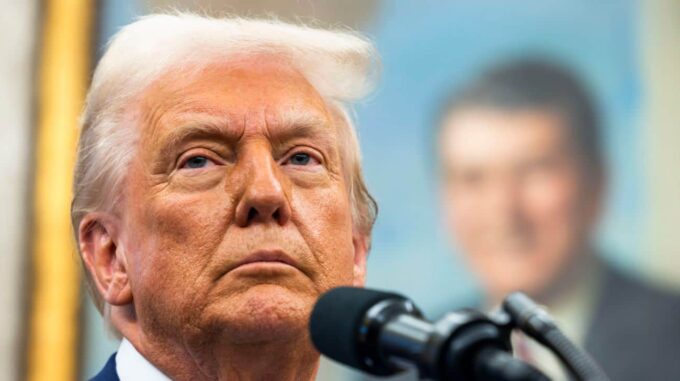Donald Trump Avoids Answering Regarding Possible Escalation of Pressure on Russia

During a recent meeting with international journalists at the White House aimed at highlighting pressing contemporary issues, former U.S. President Donald Trump refused to provide a specific response concerning his stance on the potential increase of pressure on Russia to facilitate a peaceful resolution in Ukraine. Details of the incident were reported by the information agency "European Pravda." During the conversation with diplomats and journalists, one of the participants asked a question related to potential changes in Washington’s policy towards Russia: whether President Trump is willing to apply additional measures of pressure to compel Moscow to cease its aggression and return to peace negotiations. In response, the former U.S. leader, with a mixture of irony and implication, emphasized that he was the initiator of the halt of the Nord Stream 2 pipeline project, which runs to Germany and caused significant resonance in European political circles. “Remember, I was the one who put an end to this project, and no one else contributed to it. Then Biden came onto the scene and immediately approved it,” Trump noted, hinting at his political decisions that had important implications for Europe's energy security. Addressing German Chancellor Olaf Scholz, the former president referred to the United States' internal resources, particularly its abundant oil and gas reserves, expressing confidence that, if necessary, the U.S. could utilize its energy potential in trade negotiations, considering the global market situation. This could serve as an additional leverage in diplomatic relations with Russia to achieve the desired peace in Ukraine. Previously, Trump had repeatedly expressed his stance on Russia policy, emphasizing that he refrains from imposing sanctions on Moscow if such measures could hinder the achievement of important agreements and accords. He stressed that sanctions should not become an obstacle to dialogue and efforts to stabilize the regional situation. At the same time, Ukrainian President Volodymyr Zelensky’s reaction to the escalation of the conflict in the Kherson region inadvertently underscores that, regardless of the positions of other world leaders, the U.S. holds the leverage to influence the situation. In particular, he hinted that American policymakers have the potential influence necessary to encourage the Russian side to cease destruction and severe attacks ongoing in this strategic region. Experts and international analysts discuss possible scenarios for the development of events around Ukraine, the roles of the U.S. and Russia in this conflict, and diplomatic efforts aimed at achieving peace. At the same time, Donald Trump’s refusal to directly answer questions about increased pressure creates an additional nuance in bilateral and global diplomatic relations, leaving open questions about possible future shifts in American policy towards Russia and Ukraine. In conclusion, the situation remains tense and dynamic, with the global community focused on finding balanced and effective solutions to end the conflict, taking into account the interests of all parties. Meanwhile, official statements and actions by key players remain ambiguous, and the question of possible escalation of pressure on Russia remains open and debated within diplomatic circles.

